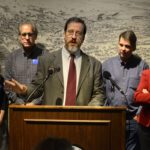Emerald Coast Writing Project hosts first-ever virtual summer institute
This summer, the Emerald Coast Writing Project transitioned its annual Invitational Summer Institute to a virtual format in response to the COVID-19 pandemic, hosting more than 140 teachers for a successful reunion called "The NWP Reboot 2020."

This summer, the Emerald Coast Writing Project transitioned its annual Invitational Summer Institute to a virtual format in response to the COVID-19 pandemic, hosting more than 140 teachers for a successful reunion called “The NWP Reboot 2020.”
“What amazed me most is that even during this stressful time, teachers wanted to spend three days together despite their long ‘to-do’ lists,” said Dr. Susan Densmore-James, the director of the Emerald Coast Writing Project at UWF. “It just reinforces that writers need other writers, and teachers of writing need other teachers of writing. It is all about community.”
Now in its fifth year, 220 teachers from Escambia and Santa Rosa County school districts have attended the Emerald Coast Writing Project’s summer institute. This year, 100 previous attendees-turned teacher consultants met at the end of July to regroup, brainstorm and share ideas. The daily National Writing Project practice of “Writing in the Day” and “Writing Out of the Day” allowed for the creative juices to flow and gave the teachers time to discuss what is critical for students and teachers during this unprecedented year.
The video sessions and the Padlet app created a virtual space to conduct meaningful academic exercises and creatively-stimulating activities for the upcoming year. Teacher Consultants were able to invite one guest who has not attended the summer institute, resulting in 40 new faces for the first virtual event.
James said she utilized the 2020 summer institute to model using Padlet in a classroom setting. A software that allows individuals to make and share content with others, Padlet can be used to post lessons, engaging book titles, interviews of authors, technology strategies and quick tutorial videos.
“It’s a one-stop shop, where the teachers can brainstorm ideas and help one another with problem-solving, while continuing our mission of providing engaging, research-based reading and writing strategies for K-12 students,” James said. “The notes posted by teachers and students can contain links, videos, images and document files. Padlet allows teachers to create as many ‘walls’ or online notice boards as they would like and give them and their students a place to brainstorm.”
One of the presenters, Dr. Bryan Ripley-Crandall, joined from his home in Connecticut to lead a writing activity.
“This year we all longed to be together and have a central place to brainstorm and store reading, writing and technology tools,” James said. “Seeing all the faces on the Zoom calls reminded us that we are a community, and we can do anything together.”
The National Writing Project is a network of sites anchored at colleges and universities, serving teachers across disciplines and at all levels from early childhood through higher education. One of only four locations in the state of Florida, UWF was established as a National Writing Project Site in 2015.
For more information about the UWF Emerald Coast Writing Project, visit uwf.edu/ecwp.


